Interested in “Go-To” trout flies for June that will also catch grayling while fishing on the Welsh Dee and other rivers in the North West?
Well, you’ll find this post useful and interesting. Especially, if you are a newcomer to river fly fishing.
Initially, I thought it would be a challenge to put together a list of my best trout flies for June because of the variety of flies I’ve seen in June during 30 years of fly fishing rivers in the North West:
Upwinged flies:
- Large Dark Olive
- Iron Blue Dun
- Medium Olive
- Blue-winged Olive
- Olive Upright
- Pale Watery Dun
- Yellow May Dun
Sedges :
- Black sedge
- Cinnamon sedge
- Medium sedge
- Welshman’s Button
Others :
- Alderfly
- Midges
However, after analyzing my detailed fishing log, I was surprised that selecting the best-performing trout flies for June was easy because….
Seventy-five per cent of the June trout I have caught fell for one of the three wet flies:
- 35% on a black hopper (size 14)
- 25% on a March Brown spider (size 14)
- 15 % on Iron blue dun (wet) (sizes 14 & 16)
Therefore, my default recommendation would be to start with a three-fly cast on a 3 lb copolymer (point: black hopper #14; middle dropper: March Brown spider #14; top dropper: Iron Blue #14).
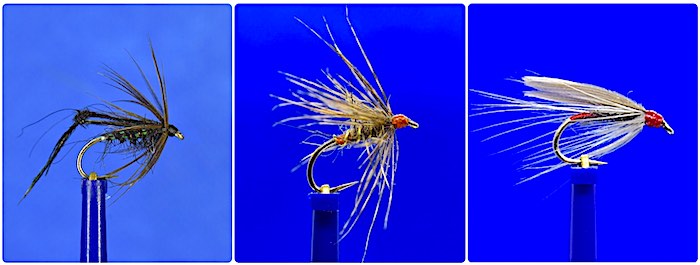
If you are new to fly fishing and want to fish one fly, it would have to be a…
“size 14 black hopper”
Because it has accounted for most of the fish I have caught during June on all rivers in the North West.
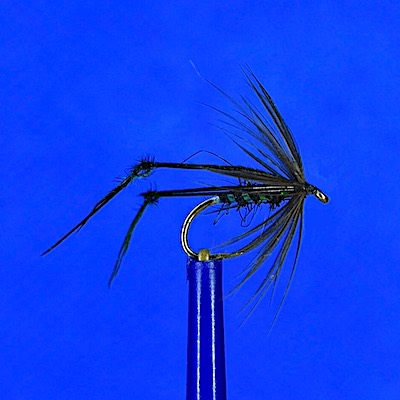
Black Hopper (wet)
- Hook: Kamasan B170 size 14
- Thread: Black UNI-Thread 8/0
- Body: Black seal fur substitute
- Rib: Uni Pearl Mylar #14 (1/32)
- Legs: Knotted black pheasant tail
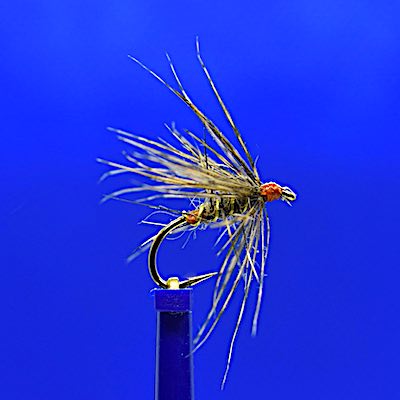
March Brown Spider
- Hook: Kamasan B170 size 14
- Thread: Burnt orange UNI-Thread 8/0
- Body: Fox squirrel dubbing
- Rib: Fine gold wire
- Hackle: Brown partridge neck feather
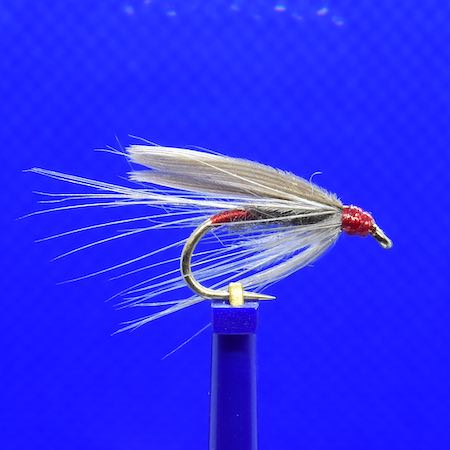
Iron blue dun wet fly
- Hook: Kamasan B170 size
- Thread: Grey UNI-8/0
- Tail: Iron blue cock fibres
- Tag: Red UNI thread -6/0
- Body: Tan UNI-Thread 8/0
- Wing: Starling
- Hackle: Iron blue hen
How to fish wet flies during summer
When the Welsh Dee is at its summer level, your wet fly fishing efforts are best focused in two places during the day:
- the fast water leading into pools, and
- the tails of pools
Because more often than not that is where the trout will be lying.
However, in the evening trout will often drop back into the main section of the pool as night approaches.
Now let’s consider what to do if the above approaches fail to catch trout and grayling.
Supporting Trout flies for June:
Dry flies – grayling and trout flies for June
When trout and grayling are preoccupied with taking dry flies, the best approach is to try and match the hatch. As a beginner, this can be a difficult task which is made easier with this mobile-friendly guide on…
If that doesn’t work, I’ve found that a deadly method for these fussy fish is a double dry fly set-up consisting of a:
- sight fly – size 12, elk hair caddis (cream tag), and
- trailing fly – size 18 or 20, Griffith’s Gnat – 18” behind the sight fly, or
- trailing fly – size 18 or 20 Black Gnat
- trailing fly – size 16 or 18 Iron Blue Dun
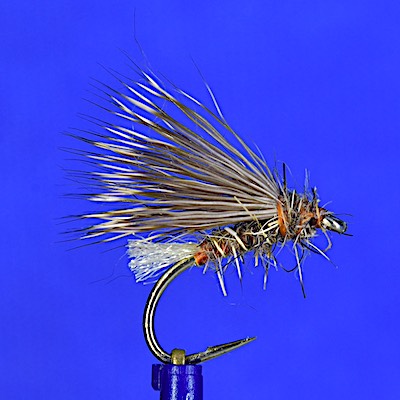
Elk hair caddis
- Hook: Kamansan B170 (#14 & 12)
- Thread: 8/0 Burnt orange
- Tag: Cream Antron Yarn
- Body: Fox Squirrel dubbing (WAPSI)
- Rib: Gold wire
- Wing: Natural elk hair
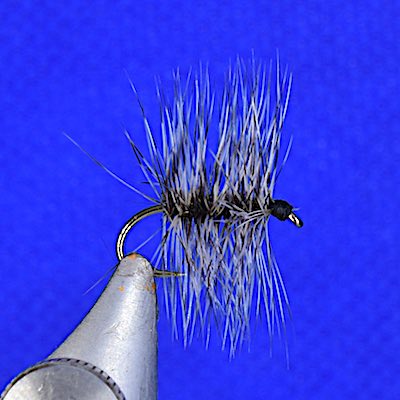
Griffith’s Gnat
- Hook: Kamasan B170 (#18 & 20)
- Thread: Black UNI 8/0
- Body: Peacock herl
- Hackle: palmered Grizzle cock
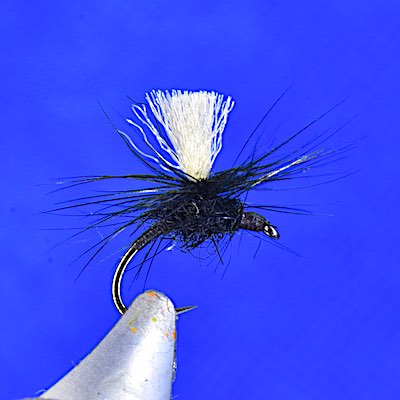
Black Gnat
- Hook: Kamasan B100 (#16 to 20)
- Thread: Black 8/0
- Wing post: Cream Antron yarn
- Body: Black 8/0 head
- Thorax: Black dubbing
- Hackle: Black cock
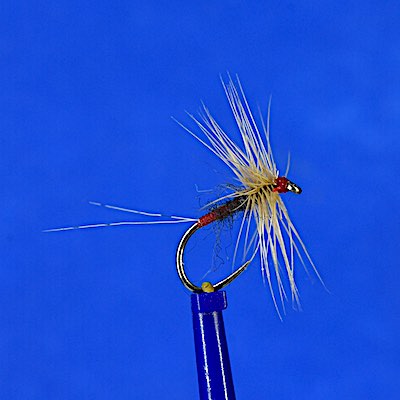
Iron Blue Dun
- Hook: HENDS BL454 (#16 & 18)
- Thread: Red UNI 8/0
- Tail: Coq De Leon
- Tag: Red thead
- Body: Mole Fur
- Hackle: Medium Dun cock
On the rare occasions when all the above has failed, let’s now consider what might avoid a blank…
Czech / Euro nymphs – trout flies for June
Czech / Euro nymphing is not everyone’s cup of tea, but when the fish are feeding on the riverbed, I find it the best way to catch them.
Consider the following scenario…
“After some great sport on dry or wet flies in the morning, the river turns dead from mid-day until the sun starts to fall in the evening.”
How do you fill in the hours until evening?
- Go to the pub for a long lunch and rest – not a bad option, or
- Search for where fish have gone.
If it’s the latter, then you will need to switch to nymphing the deep, shady pockets of water, where you will find trout and grayling feeding on small nymphs and caddis.
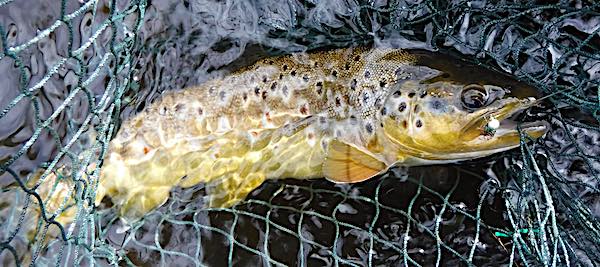
Over years of practice, I found fishing a couple of sizes 16 or 18 nymphs above a heavy (ca. 4-5mm) tungsten bead point nymph works well.
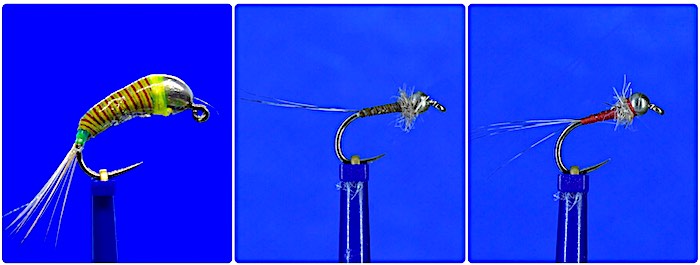
Normally, one of the following small nymphs will produce trout of grayling, from the deep:
- size 16 red nymph with a 2 mm tungsten bead
- size 16 Hare’s ear nymph with a 2 mm tungsten bead
- size 16 Quill nymph with a 2 mm tungsten bead
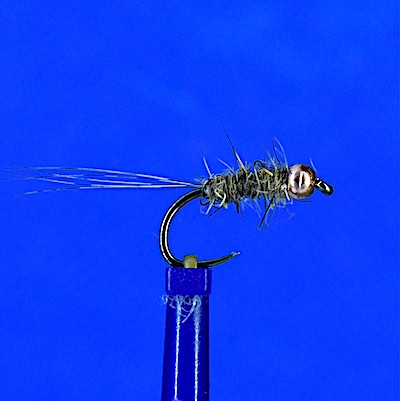
Hare’s Ear Nymph
- Hook: HENDS BL 454 #16 or 18
- Bead: 2 mm tungsten (natural, copper or gold)
- Thread: Brown UNI-Thread 8/0
- Body: Hare’s Ear dubbing
- Tail: Cul De Leon
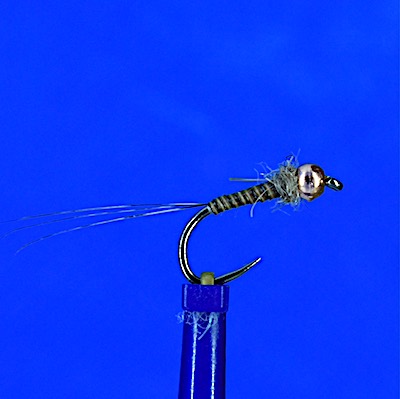
Peacock Quill nymph
- Hook: HENDS BL454 #16 or 18
- Bead: 2mm tungsten (natural or copper)
- Thread: Brown UNI-Thread 8/0
- Thorax: Fox squirrel dubbing
- Body: Stripped peacock
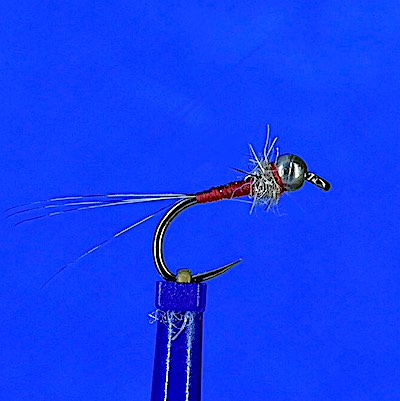
Red nymph
- Hook: HENDS BL454 #16 or 18
- Bead: 2 mm tungsten (natural or copper)
- Thread: Red UNI-Thread 8/0
- Body: Red UNI-Thread 8/0
- Thorax: Fox squirrel dubbing
- Wing case: Pearl Mylar 1/8”
Below is a list of posts that you’ll find interesting, which cover how I have used the advice for fishing on the Welsh Dee in June
- Fishing in June on 2 beautiful Welsh river
- June fishing report Welsh Dee & River Ribble: beautiful trout and grayling
- Exploration of Midland Fly Beat of the Welsh Dee
- Mayfly fishing on the beautiful River Derwent
All the above advice is based on my fishing records, and it’s a reliable starting point for a newcomer to fishing the Welsh Dee and other rivers in the North West.
If you are interested in fishing the Welsh Dee it has some excellent Day Ticket Water. Also, it would be great to hear of any trout flies for June that you wouldn’t be without.
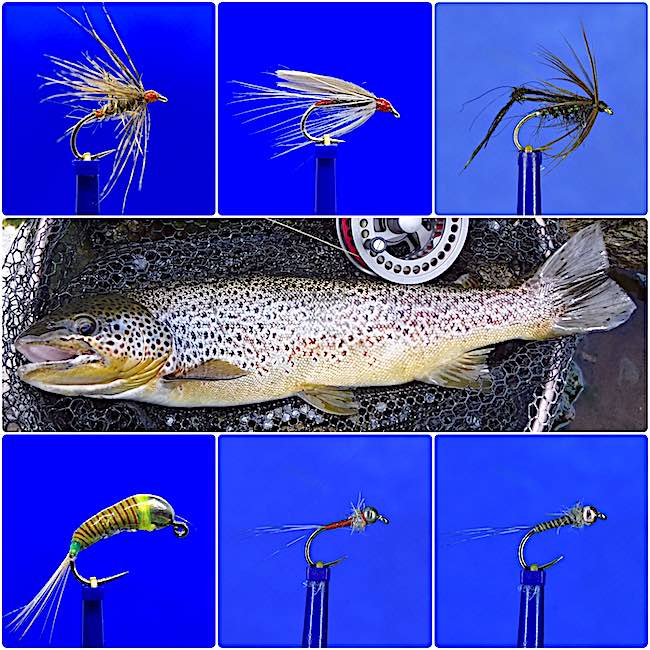
fantastic tips will save a lot of time when I’m not getting any bites!
Hi Simon,
Let’s hope the tips help you avoid a blank. Thanks for the comments, Andrew
Thanks again for a really useful blog. I have just started fly tying, unfortunately mine look like an unmade bed. Your stats were most interesting. I have just attempted tying a few spiders and the spent ages stripping crow feathers to make notted legs. I saw your pattern a few weeks ago and had to raid our Christmas decorations to get the green tinsel. I have tied some with a silver rib. I have had a lot of success with the Grithiths Nat with Grayling. Last two sizeable trout were caught on Iron blue and Medium Olive dry flies.
I have noticed your fly heads always look neat and professional, what do you to get the glossy finish.
P.s been to Eyton stretch of the Dee it is unfishable, the river is much more murky than the Broken bridge section.
Hi Tim,
Glad to hear you have found this blog useful. With fly tying you will just need to stick at it and your results will improve. For the heads, I give the thread a coat with Hard-as-Nails nail varnish. When tying you flies for the Welsh Dee try to tie them sparsely. If they are a bit scruff the fish don’t seem to mind, I’ve caught plenty of fish on flies that have almost been completely destroyed. Cheers, Andrew
Great fly pattern tip, size 14 black Hopper. I caught a number of Brown Trout after changing a size 16 / 18 spider to a size 14 Hopper whilst fishing on the Lancashire Calder this week. I think it helps sometimes to have a larger target fly on the point of a smaller wet fly team (size 16 / 18 hooks). It’s my belief that a fish may be attracted to the Hopper, either taking the fly itself or turning its attention to a smaller dropper fly. During my last fishing session I caught two fish on a Hopper and three on a size 18 black Spider dropper. Before changing to the Hopper as the point fly I had tried a few different size 16 spider patterns for just a single fish.
The black Hopper definitely had a positive reaction from the fish on this particular day :).
Hi Andrew,
It’s great to hear that you have been getting some great sport on the black hopper. I find it a very versatile fly which will often catch trout and grayling on the rivers when nothing else seems to be working. It always has a place in my fly box.
Cheers, Andrew
nice job Andrew a good selection of flies food for thought
brilliant article as usual
Hi Colin,
Thanks for the feedback and it’s great to hear you enjoyed June’s fly selection.
Cheers, Andrew
Thanks Andrew the black gnat and the Griffiths have been two of staples in my fly box for the Welsh Dee
Cheers.
Hi Andrew – this is really helpful. Any tips on how to fish the wet flies … retrieve or just run with the water ….?
Hi Andy,
Attached is a link to how I normally fish wet flies:
https://hawker-overend.com/how-to-fish-the-wet-fly/
I hope you find it useful.
Cheers, Andrew
Just looking for my very first setup,can anyone point me in the right direction,will be fishing mainly the Dee and the Alyn,and best place to buy flys etc
Love this great advice. Not only does it reaffirm things in my own mind but also and invariably introduces me to something I’ve never considered: in this case the double dry technique! Genius! I will definitely try that out on my river where the fish can get very picky very quickly, especially at this time of year when they are stuffed full of mayflies and BWO’s.
Hi Charles,
Great to hear you enjoyed the post. The double dry fly method is great for when the trout get fussy and you have to fish a small fly at distance to tempt them.
It would be great to know how you get on with it on your local river.
Cheers, Andrew
Good tips as usual, many thanks
Great to hear.
Cheers, Andrew
Totally new to fishing rivers. Your blog is a great source of information as is your website.
Hi Neil,
Great to hear you are finding my website and blog useful. I hope it helps you develop your river fishing skills.
Tight lines, Andrew
Another great selection, thanks Andrew
Hi Steve,
Wonderful to hear that you enjoyed it.
Cheers, Andrew
A really interesting article with many flies that I tie myself and enjoy using over here in North Yorkshire. Really helpful to include tying instructions and advice on where, when and how to fish them.
Hi David,
It has been a while since I fished in North Yorkshire, I must make the effort to take a trip down memory lane.
Tight lines, Andrew
Really useful, thanks.
as a new member of Bala I have only fished Llanderfell twice. It would be even more useful if you could explain where the Dyke is?
a map/diagram of the relevant pools would also be good.
stenks.
Hi Steve,
Attached is a link to a couple of other posts I’ve written on fishing at Llandderfel, which have maps of the places I like to fish.
https://hawker-overend.com/category/welshdee/llandderfel/
The dye area is opposite point B on the maps, which is best fished from the right bank when facing downriver.
I hope this helps, Andrew